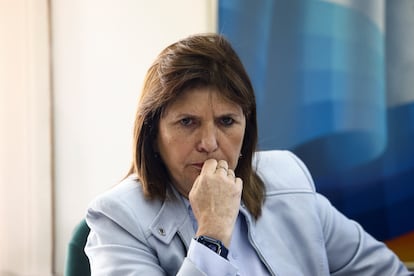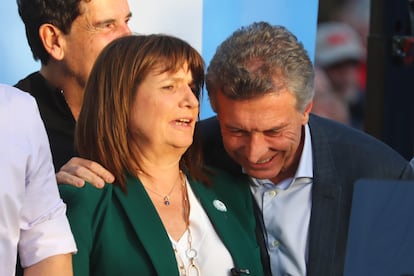Patricia Bullrich’s decision to endorse right-wing candidate Javier Milei throws Argentina’s opposition into disarray
The moderate sectors of Together for Change, the coalition that brought Mauricio Macri to power in 2015, warn that they will not support the endorsement of the radical libertarian


It took 10 years for former president Mauricio Macri to turn his party, Pro, into a leading political force. And less than 24 hours to destroy it. Pro is part of the Juntos por Cambio (Together for Change) coalition, which brought Macri to power in 2015. This coalition chose Patricia Bullrich as its presidential candidate, but she was knocked out of the race on Sunday, after winning just 24% of the vote in the first round of the election. That vote was won by Sergio Massa, Argentina’s economy minister and the candidate for the left-wing Peronism political movement, with the far-right leader Javier Milei coming in second place.
With the runoff scheduled for November 19, both Milei and Massa are hoping to win over the 6.2 million Argentines who voted for Bullrich.
Bullrich and Macri publicly endorsed Milei on Wednesday, but the move was met with a fierce backlash from the Together for Change coalition, which also includes the century-old Radical Civic Union (UCR) and other centrist parties, such as Civic Coalition. Pro was the hardest hit of all: moderates in the party felt betrayed, while hardliners said they would not abide by a “unilateral” decision that was made without prior consultation.
The decision to support Milei came after Bullrich and Macri held a secret meeting with Milei on Tuesday at midnight. “While hawks and doves were fighting, a crazy bird appeared,” summarized a senator who was a member of the Together for Change coalition. The “crazy bird” is Milei.
Milei burst into Argentine politics two years ago, promising to tear the system down. Appearing at rallies with an actual chainsaw, he yelled that the political caste was afraid and furiously attacked the old guard of politicians, who he described as “thieves and murderers.” No one escaped his blunt words.
Mieli said Kirchnerism — the political movement based on the ideas of former presidents Néstor Kirchner and Cristina Fernández de Kirchner, which is considered a branch of Peronism — was “the worst thing to happen to Argentina.” He called UCR a pack of “lying swindlers.” And said Bullrich was a “bomb thrower” who “killed children in a kindergarten” in the 1970s, in reference to her involvement in a youth political group. As for Macri, Milei said that he was “soft,” describing him as the face of “good-mannered Kirchnerism” who had ruined the country like the rest of the “political caste.”
Shouting “Long live freedom, damn it,” Milei destroyed all possible bridges with other parties during the presidential campaign. But after finishing second in the first round of the vote, he quickly sought to mend the damage, calling on Together for Change to support his bid to “annihilate the gang of criminals,” in reference to Kirchnerism. “It would be irresponsible not to forgive,” he said.
And Bullrich and Macri forgave him. The two most important leaders of Pro, the largest party in the Together for Change alliance, met secretly with the far-right leader who had insulted them for months and agreed, without notifying the rest of the coalition, to support him in his campaign for the presidential runoff.
Bullrich justified her decision to endorse Milei with a phrase from independence leader José de San Martín: “When the homeland is in danger, everything is allowed, except not to defend it.” For Bullrich, the danger is Kirchnerism, which she accuses of causing Argentina’s decline.
Milei, Macri and Bullrich signed a document in which they committed to respecting basic democratic principles, which had been questioned by the radical libertarian. This included a pact not to legalize the free carrying of weapons and the sale of organs, and a pledge not to eliminate public health and education. The document, however, makes no mention of Milei’s star policy to dollarize the Argentine economy.

Bullrich’s endorsement of Milei had the devastating effect that everyone expected. Within Pro, it revealed the hidden divide between moderates and hardliners in the party. Horacio Rodríguez Larreta, the current Chief of Government of the City of Buenos Aires, is a moderate from the Together for Change coalition. Rodríguez Larreta — who was defeated by Bullrich in the party’s presidential primaries — said he was “surprised” to learn of the secret midnight meeting.
“Milei is on the fringe of democracy and his ideas are dangerous. Massa represents the reelection of Kirchnerist populism. The third alternative is to work to keep Together for Change as strong as possible so that it is an alternative,” he said Wednesday night at a press conference. “We owe ourselves a self-criticism about the ways of functioning and deciding, because that’s how it went for us,” he added, referring to Sunday’s defeat.
Rodríguez Larreta insisted that the coalition needs to regain its position as the alternative to Kirchnerist Peronism, a position it had held since 2015. But he did not say whether that means leaving aside Macri and Bullrich.
Gerardo Morales, the governor of the northern province of Jujuy and president of the UCR, said that Bullrich had “embarrassed” him and that Macri was “largely responsible for the [coalition’s] defeat” in the first round. “This is what he wanted from the beginning, to screw Together for Change,” he said of the former president.
Elisa Carrió, the founder of the Civic Coalition, was just as direct: “Macri always wanted to be with Milei.”
For both Morales and Carrió, the former president and Bullrich no longer belong in the opposition coalition.
What will come of Together for Change is still unknown. Rodríguez Larreta is trying to keep the coalition united. Ten of Argentina’s 24 governors are from the Together for Change coalition, from the ranks of Pro and the UCR. These governors are not willing to campaign for Milei and need Together for Change to guarantee governability in their provinces. If united in a single bloc, they will be in a stronger position when it comes to negotiating with the national government, which as of December 10, will either be in the hands of Milei or Massa. Whatever the result of the runoff, they will be in the opposition.
Sign up for our weekly newsletter to get more English-language news coverage from EL PAÍS USA Edition
Tu suscripción se está usando en otro dispositivo
¿Quieres añadir otro usuario a tu suscripción?
Si continúas leyendo en este dispositivo, no se podrá leer en el otro.
FlechaTu suscripción se está usando en otro dispositivo y solo puedes acceder a EL PAÍS desde un dispositivo a la vez.
Si quieres compartir tu cuenta, cambia tu suscripción a la modalidad Premium, así podrás añadir otro usuario. Cada uno accederá con su propia cuenta de email, lo que os permitirá personalizar vuestra experiencia en EL PAÍS.
¿Tienes una suscripción de empresa? Accede aquí para contratar más cuentas.
En el caso de no saber quién está usando tu cuenta, te recomendamos cambiar tu contraseña aquí.
Si decides continuar compartiendo tu cuenta, este mensaje se mostrará en tu dispositivo y en el de la otra persona que está usando tu cuenta de forma indefinida, afectando a tu experiencia de lectura. Puedes consultar aquí los términos y condiciones de la suscripción digital.








































